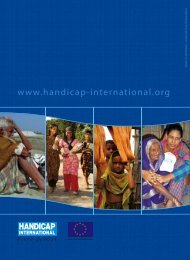Full page photo print - Harvard Law School Project on Disability
Full page photo print - Harvard Law School Project on Disability
Full page photo print - Harvard Law School Project on Disability
Create successful ePaper yourself
Turn your PDF publications into a flip-book with our unique Google optimized e-Paper software.
• <strong>Disability</strong>-based discriminati<strong>on</strong> in employment settings may deprive people with<br />
disabilities of the means to earn an income to support themselves;<br />
• The lack of accessible transportati<strong>on</strong> not <strong>on</strong>ly deprives people with disabilities of the<br />
right to liberty of movement, but also harms their ability to access work, educati<strong>on</strong>,<br />
healthcare, and shops, as well as to interact fully with the community;<br />
• Services such as medical care or rehabilitati<strong>on</strong> that are available to others locally in<br />
a general hospital or <strong>on</strong> an outpatient basis may <strong>on</strong>ly be available to pers<strong>on</strong>s with<br />
disabilities in an instituti<strong>on</strong>al setting;<br />
• The lack of an adequate standard of living may force people with disabilities to live in a<br />
segregated instituti<strong>on</strong>al setting or with family members merely for survival reas<strong>on</strong>s, such<br />
as access to food and shelter;<br />
• The lack of accessible housing may greatly reduce the choices available to people with<br />
disabilities who want to live in a particular community;<br />
• Negative and discriminatory attitudes towards people with disabilities may make<br />
pers<strong>on</strong>s with disabilities feel uncomfortable or unsafe am<strong>on</strong>g other community<br />
members and in turn encourage them to avoid such interacti<strong>on</strong>s. Such attitudes may<br />
even encourage family members to hide their family members with disabilities from the<br />
community.<br />
Violati<strong>on</strong>s of the right to live independently in the community also frequently lead to violati<strong>on</strong>s<br />
of other human rights. For example, forcing people with disabilities to live in segregated<br />
settings deprives them of the opportunity to participate fully in the social, cultural, and political<br />
life of their community. Children with disabilities who must live apart from their families are<br />
deprived of the opportunity to grow up in a family setting, and often are denied quality inclusive<br />
educati<strong>on</strong>. Instituti<strong>on</strong>al settings can often expose people with disabilities to a higher risk of<br />
violence, sexual abuse and even death, especially women and girls with disabilities and people<br />
with intellectual disabilities. Segregated settings may also deprive people with disabilities of<br />
the opportunity to exercise their right to marry and have a family of their own. These examples<br />
illustrate that human rights are indivisible, interdependent, and interc<strong>on</strong>nected. Above all,<br />
violati<strong>on</strong> of the right to live independently in the community disrespects the basic dignity of<br />
people with disabilities that is inherent in all human beings.<br />
exeRcise 11.1: what does it mean to live independently and<br />
with Dignity in the Community?<br />
objective: To understand what it means to live independently and with dignity<br />
Time: 30 minutes<br />
materials: Chart paper and markers or blackboard and chalk<br />
1. brainstorm/discuss:<br />
Brainstorm, listing resp<strong>on</strong>ses:<br />
• What does “living independently” mean to you? To your community?<br />
• Where and how do most people with disabilities in your communities live?<br />
• Who in your community is typically placed in an instituti<strong>on</strong>? What kinds of disabilities do<br />
they typically have?<br />
• Do you know people with disabilities who live independently according to your<br />
definiti<strong>on</strong>?<br />
150 hUmAn RighTs. yes! AcTi<strong>on</strong> And AdvocAcy <strong>on</strong> The RighTs of PeRs<strong>on</strong>s wiTh disAbiliTies




